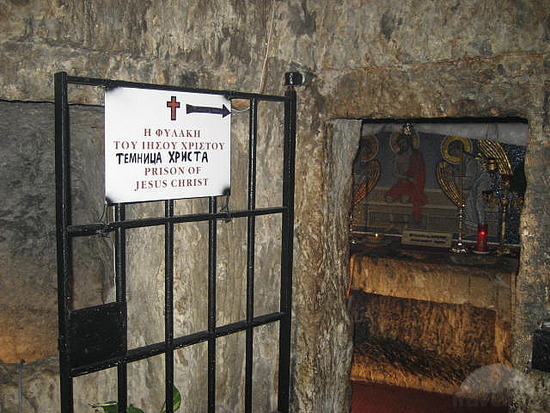Pilate’s Court │Praetorium

In the canonical gospels, Pilate’s court refers to the trial of Jesus in praetorium before Pontius Pilate, preceded by the Sanhedrin preliminary hearing. In the Gospel of Luke, Pilate finds that Jesus, being from Galilee, belonged to Herod Antipas’ jurisdiction, and so he decides to send Jesus to Herod. After questioning Jesus and receiving very few replies, Herod sees Jesus as no threat and returns him to Pilate. Fearing defilement, the Jews did not enter the court, and Pilate’s discussion with them occurred outside the praetorium.
It was noted that Pilate appears as an advocate pleading Jesus’ case rather than as a judge in an official hearing.
Praetorium site
Two possible praetorium sites in Jerusalem have been proposed: the Antonia Fortress and Herod’s Palace. Early pilgrims to Jerusalem generally identified the praetorium with the Antonia Fortress, where the traditional Way of the Cross begins. The archaeological evidence, which dates the fortress remnants to the 2nd century AD, as well as the tense situation requiring Pilate to be near the Second Temple as the center of Passover activity, support the Antonia Fortress location.
The Gospel of Mark uses the word aulē (“hall”, “palace”) to identify the praetorium. Outside the praetorium proper, there was an area called the Pavement.[Jn. 19:13] Pilate’s judgement seat (Greek: bēma), in which he conversed with the Jews, was located there.
As the religions professed by the Jews (Second Temple Judaism) and the Romans (Religion in ancient Rome) were different, and since at the time Jerusalem was part of Roman Judea, the charges of the Sanhedrin against Jesus held no power before Pilate. From the three charges brought by the Jewish leaders (perverting the nation, forbidding the payment of tribute, and sedition against the Roman Empire), Pilate picks up on the third one, asking: “Are you the King of the Jews?” Jesus replies with “You have said so”.[Mt. 27:11][Mk. 15:2][Lk. 23:3] Then the hearing continues,[Jn. 18:33-38] and Pilate finally asks Jesus “What is truth?”
Stepping back outside, Pilate publicly declares that he finds Jesus to be innocent of the charges, but the crowd still insists on capital punishment. The universal rule of the Roman Empire limited capital punishment strictly to the tribunal of the Roman governor and Pilate decided to publicly wash his hands as not being privy to Jesus’ death. Nevertheless, since only the Roman authority could order crucifixion and since the penalty was carried out by Roman soldiers, Pilate was indirectly responsible for the announcement of Jesus’ death.
Source : wikipedia
https://www.youtube.com/watch?v=7dAmKSKQikc
https://www.youtube.com/watch?v=Ml_ChEW98bk
https://www.youtube.com/watch?v=0jjOCe9UZa8


Rate this article